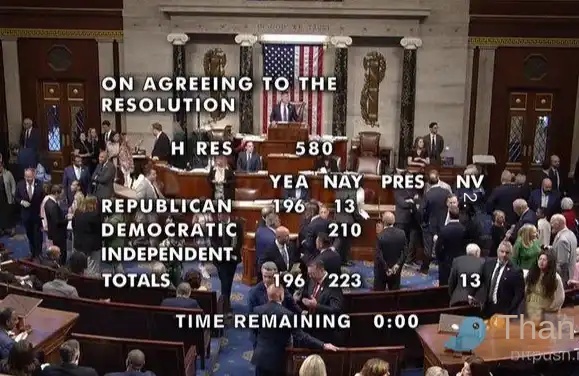「Crypto Week」 Setback: House Vote Derails, Trump Steps in to Turn the Tide
Original Article Title: "House Cryptocurrency Bill 'Hits Snag,' Trump Gets Impatient"
Original Source: BitpushNews
Bitpush Editorial Note: This morning, Trump took to social media to announce that he has met with 11 out of the 12 required lawmakers for the passage of the GENIUS Bill, all of whom have agreed to support the relevant bill the next morning. The U.S. House of Representatives has scheduled a procedural vote for tomorrow around 00:20 Beijing time. If passed, it will be followed by related debates and a final vote.
This was seen as a "highlight moment" for the cryptocurrency industry in Washington during "Crypto Week," but encountered a setback on Tuesday when three cryptocurrency regulatory bills pushed by Trump unexpectedly "stalled" in a procedural vote.

The voting outcome on Tuesday stood at 196 in favor and 223 against. 13 Republican lawmakers joined Democrats in casting dissenting votes, collectively preventing the procedural motion that would have enabled the bill to proceed to substantive debate.
This means that unless the House passes the related procedural rules again, these bills carrying industry hopes will not be able to enter the substantive debate phase.
"Crypto Week" Vision: Trump Personally Oversees
Earlier this week, the mood in Washington's crypto industry was upbeat, with expectations across the board that these bills would pass smoothly.
Trump himself also rallied for "Crypto Week" on his "Truth Social" platform, portraying it as a crucial step in making the U.S. the "undisputed, number one leader" in the digital asset space. He called on all Republican lawmakers via social media to vote in favor, firmly believing that "the GENIUS Bill will make our great country leapfrog China, Europe, and all other countries by light-years; they are tirelessly catching up, but just can't do it."

The obstructed cryptocurrency legislation "package" included three key bills for the industry:
· GENIUS Bill: This bill on stablecoin regulation received partial Democratic support in the Senate last month and passed successfully. It aims to provide a clear regulatory framework for stablecoins, seen as a crucial key to unlocking broader institutional adoption.
· CLARITY Bill: This bill seeks to clarify the classification rules for digital assets, specifying which assets should be regulated by the U.S. Securities and Exchange Commission (SEC) as securities and which should be regulated by the Commodity Futures Trading Commission (CFTC) as commodities, to end the long-standing "regulatory gray area" plaguing the industry.
· Central Bank Digital Currency (CBDC) Ban Bill: This proposal aims to prohibit the Federal Reserve from creating a central bank digital currency, reflecting some lawmakers' concerns about government-controlled digital currency.
These bills are seen as a cornerstone for the United States to establish a comprehensive and predictable regulatory framework in the digital asset field, providing much-needed certainty to the market, attracting more capital and innovation.
"Dissent" Emerges Within the Republican Party
The most notable aspect of this vote was the "backlash" from 13 Republican members. According to The Hill, several Republican representatives, including Marjorie Taylor Greene, Chip Roy, Michael Cloud, and Anna Paulina Luna, cast opposing votes.
Marjorie Taylor Greene from Georgia publicly explained her position on social media.
She stated that the "GENIUS Act" failed to include a ban on Central Bank Digital Currency (CBDC), and Speaker Johnson did not allow relevant amendments to be submitted. Greene emphasized that Trump's executive order on January 23 already included a CBDC ban, so Congress must also include it in the "GENIUS Act." She believes that "Americans do not need a government-controlled central bank digital currency."

House Speaker Johnson also found himself in a dilemma. After the failed vote, he stated that Republicans are "still in dialogue, answering questions," trying to appease and win the support of these conservatives.
However, he also admitted that bundling all three bills (especially the stablecoin bill already passed by the Senate and the CBDC ban bill demanded by hardliners) into one "big package" is not feasible. A senior Republican member bluntly stated, "Bundling the vote will only lead to the demise of these bills in the Senate." This statement reflects the strategic dilemma faced by the Republican leadership in balancing intra-party faction demands and ensuring legislative feasibility.
Subsequent Vote Suspense: Compromise or Deadlock?
After news of the failed vote spread, stocks related to cryptocurrency saw a sharp decline: stablecoin issuer Circle's stock price fell more than 7%, cryptocurrency exchange Coinbase dropped over 4%, and digital asset company MARA Holdings also saw a 2% decline in its stock price.

House Speaker Johnson has announced his desire to reschedule a procedural vote on the Cryptocurrency Bill for Wednesday local time. The Louisiana Republican, as he left the Capitol, told reporters that the party is still "in continued discussions, addressing members' concerns," and emphasized that "these cryptocurrency bills are a shared priority of the White House, Senate, and House." According to Fox News, Trump himself is reportedly "angry" about the vote and is in talks with relevant lawmakers.
Nevertheless, some industry analysts remain optimistic about the bill's future. TD Cowen policy analyst Jaret Seiberg noted in a report to clients, "It is likely that we will see another House vote on the rules tomorrow (Wednesday). If not, it could be pushed to next week." Seiberg further stated that he still expects the House to pass the "GENIUS Act" because "Trump is pushing for its enactment." He believes that even if members of the House "Freedom Caucus" oppose accepting the Senate version of the bill, they may ultimately make concessions at the President's request.

Cody Carbone, CEO of the Digital Chamber, also remains confident in the bill's ultimate passage. He pointed out on social media that the best way to address the ban on CBDCs is through the "GENIUS Act": "If members are interested in banning CBDCs and competing with other nationally issued digital currencies, the way to do that is through the 'GENIUS Act' and allowing the private stablecoin market to thrive in the United States."
This turn of events confirms a reality: in Washington, even an agenda strongly promoted by the President may be defeated by subtle intra-party power dynamics. When technological innovation meets political maneuvering, the road to cryptocurrency compliance is bound to be anything but smooth.
Welcome to join the official BlockBeats community:
Telegram Subscription Group: https://t.me/theblockbeats
Telegram Discussion Group: https://t.me/BlockBeats_App
Official Twitter Account: https://twitter.com/BlockBeatsAsia
 Forum
Forum OPRR
OPRR Finance
Finance
 Specials
Specials
 On-chain Eco
On-chain Eco
 Entry
Entry
 Podcasts
Podcasts
 Activities
Activities









